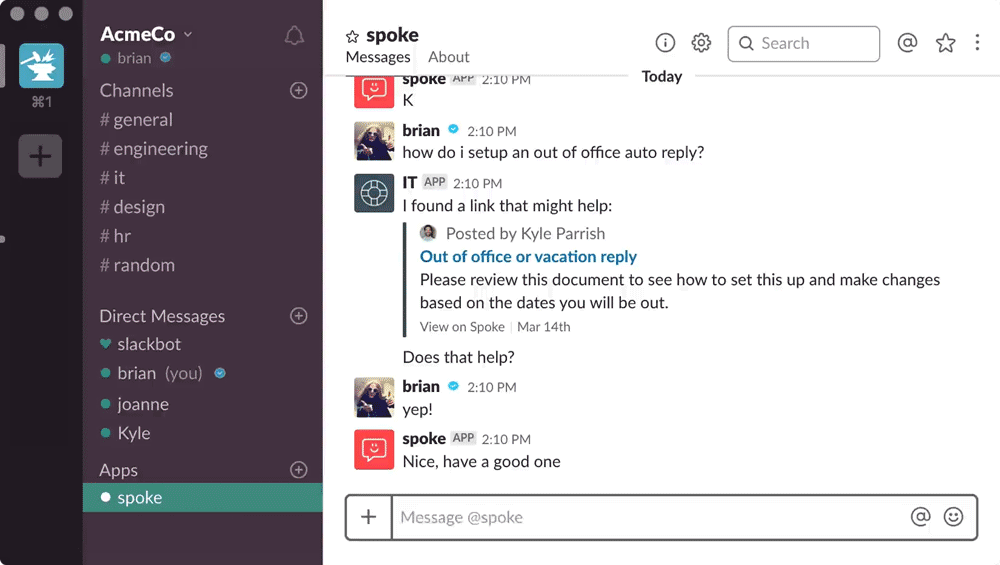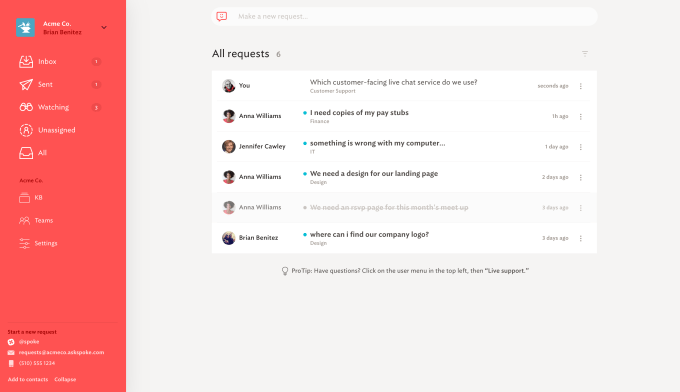When Jay Srinivasan’s last company got acquired by Google, he and his co-founders were ready to get going right away — but they couldn’t figure out how to get ramped up or where things were.
That’s sometimes a refrain you’ll hear from employees of companies that are acquired, or any employees really, who suddenly have to get used to a new system of doing things. It can go all the way down to just getting a new laptop with the right software on it. And it’s a pain point that convinced Srinivasan and his co-founders Pratyus Patnaik and David Kaneda to start Spoke, a new tool for trying to solve those workplace management and request tickets — and finally getting your laptop ready so you can get to work. Spoke is launching for general availability to day, and the company says it has raised $28 million to date from investors like Accel, Greylock, and Felicis Ventures.
“Some internal ticketing systems you can use are searchable — as you imagine it finds all the answers, the problem is when you have all that many people you get 10,000 results,” Srinivasan said. “There’s too much to look at. In a larger company, the breaking point tends to be that there are probably a bunch of relevant answers, but there’s no way to find the needle in the haystack. So I really wanted to figure stuff out from scratch.”

With many companies switching to internal collaboration tools like Slack, the theory is that these kinds of requests should be made wherever the employee is. So part of Spoke is an actual bot that exists in Slack, looking to surface the right answers right away from a database of employee knowledge that’s built up over time. But Spoke’s aim, like many workplace tools that look to be simple, is to hide a lot of complex processes behind that chat window in terms of creating request tickets and other employee queries so they can pop in and pop out quickly enough.
The other side for Spoke is for the managers, which then need to handle all of these requests. Spoke converts all those requests made through Slack (and, theoretically, other platforms) and streams them into a feed of tickets which they can then tackle one-on-one. Rather than a complex interface, Spoke aims to create a simple array of buckets that managers can pop in and pop out in order to plow through those requests as quickly as possible. As Spoke gets more and more data about how those requests are initiated — and solved — it can over time get smarter about optimizing that ticketing flow.
“If I’m the IT manager, I don’t want you to have to log into a ticketing system,” Srinivasan said. “We allow you to make a request through Slack. You’re in slack and talk to Spoke and say, hey, I need a new laptop. I want you to stay in slack or teams. And a lot of time is spent on a specialized tool like a ticketing tool — it’s the same thing as a salesperson spending time in a CRM. Slack is a good way to get an input to that tool, but I still need a specialized standalone tool.”

You could consider Spoke as one interpretation of a couple of approaches to make data about the workplace more accessible. While Spoke is going after the bot-ish, come-to-me results route, there are others looking to create more of a centralized Wiki that’s easy to find and search. At the end of the day, both of these are trying to compress the amount of time it takes for employees to find answers to the information that they need, in addition to making it less frustrating. For the latter, there are some startups like Slab that have also raised venture financing.
For Spoke, the more challenging parts may actually come from the platforms where it lives. Slack, for example, is working on tools to make information much more searchable and accessible. It’s investing in tools to, for example, help users find the right person to ask a question in order to get information as fast as possible. As Slack — and other platforms — get more and more data, they can tune those tools themselves and potentially create something in-house that could be more robust. Srinivasan said the goal is to target the whole process of the workplace request in addition to just the search problem that he hopes will make Spoke something more defensible.
“You’re not looking for knowledge, you’re looking for services,” he said. “Let’s say I need a new laptop — by all means you can search Slack to get the answer of who you need to contact. But you still need to follow up and essentially create a request with them. Slack sometimes could solve the information access to knowledge access problem, but even then it doesn’t solve the service issue. Ticketing and request management consists of requests and responses with accountability. You have to make sure nothing falls through the cracks”
from Startups – TechCrunch https://ift.tt/2E1RDw1
via IFTTT
No comments:
Post a Comment
Thank You for your Participation